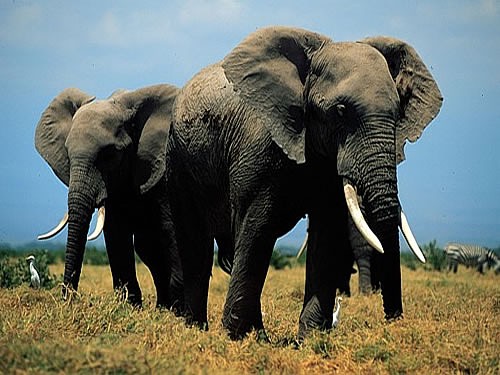Central African Countries Sign Plan To Toughen Enforcement of Elephant Anti-Poaching Laws
 June 12, 2012
June 12, 2012  Kyriaki (Sandy) Venetis
Kyriaki (Sandy) Venetis Nearly a dozen countries in Central Africa signed a plan this month to toughen anti-poaching laws designed to fight against escalating illegal wildlife trade, especially decimating elephant populations in the thousands each year.
 Cameroon Elephants. Stock Photo.
Cameroon Elephants. Stock Photo.In March 2012, the World Wildlife Fund (WWF) reported that the Cameroon military entered a national park in the north region of the country where poachers had slaughtered hundreds of elephants since January.
The WWF added that “up to 12,000 elephants are killed each year for their ivory, most in Central Africa.”
This new plan to combat the problem has been adopted by 10 member countries of the Central African Forest Commission, which are: Burundi, Cameroon, Chad, Central African Republic, Equatorial Guinea, Republic of Congo, Gabon. Rwanda, and Sao Tome e Principe. The commission is also known as COMIFAC.
This plan includes provisions to increase anti-poaching efforts in each of the participating countries and enable joint-country patrols in transboarder areas.
The wildlife ministers from the COMIFAC countries have also pledged to cooperate with law enforcement agencies, including police, customs, and judiciary systems in order to address the problem.
There is also a conference planned for sometime next year for the heads of state to address the wildlife losses and strategize on efforts to maintain biodiversity in the continent, said the WWF, which together with TRAFFIC and the U.S. Fish and Wildlife Service, has provided technical and financial support toward the development of the plan.
The WWF will also said that it will continue provide ongoing support for the implementation of the plan. Elephant poaching on the continent has been an escalating problem.
The poachers suspected of killing the elephants in North Cameroon’s Boube N’Djida National Park are “believed to be foreigners who entered the country illegally across its boarder from Chad,” said the WWF.
 alliance,
alliance,  animal rights,
animal rights,  international,
international,  wildlife | tagged
wildlife | tagged  Africa,
Africa,  anti-poaching laws,
anti-poaching laws,  poaching elephants
poaching elephants 